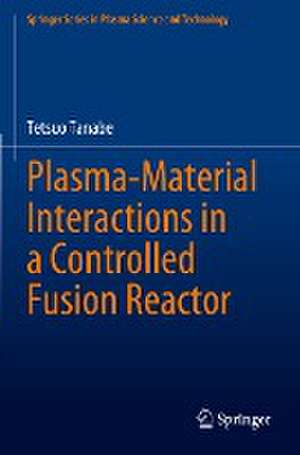Plasma-Material Interactions in a Controlled Fusion Reactor: Springer Series in Plasma Science and Technology
Autor Tetsuo Tanabeen Limba Engleză Paperback – 9 mar 2022
There are many books and reviews on PMI in the context of plasma physics, that is, how plasma or plasma confinement works in PMI. By contrast, this book features a materials aspect in PMI focusing on changes caused by heat and particle load from plasma: how PFMs are changed by plasma exposure and then, accordingly, how the changed PFM interacts with plasma.
| Toate formatele și edițiile | Preț | Express |
|---|---|---|
| Paperback (1) | 940.87 lei 6-8 săpt. | |
| Springer Nature Singapore – 9 mar 2022 | 940.87 lei 6-8 săpt. | |
| Hardback (1) | 946.87 lei 6-8 săpt. | |
| Springer Nature Singapore – 9 mar 2021 | 946.87 lei 6-8 săpt. |
Preț: 940.87 lei
Preț vechi: 1147.41 lei
-18% Nou
Puncte Express: 1411
Preț estimativ în valută:
180.03€ • 187.98$ • 148.67£
180.03€ • 187.98$ • 148.67£
Carte tipărită la comandă
Livrare economică 15-29 aprilie
Preluare comenzi: 021 569.72.76
Specificații
ISBN-13: 9789811603303
ISBN-10: 9811603308
Pagini: 207
Ilustrații: XII, 207 p. 110 illus., 78 illus. in color.
Dimensiuni: 155 x 235 mm
Greutate: 0.31 kg
Ediția:1st ed. 2021
Editura: Springer Nature Singapore
Colecția Springer
Seria Springer Series in Plasma Science and Technology
Locul publicării:Singapore, Singapore
ISBN-10: 9811603308
Pagini: 207
Ilustrații: XII, 207 p. 110 illus., 78 illus. in color.
Dimensiuni: 155 x 235 mm
Greutate: 0.31 kg
Ediția:1st ed. 2021
Editura: Springer Nature Singapore
Colecția Springer
Seria Springer Series in Plasma Science and Technology
Locul publicării:Singapore, Singapore
Cuprins
Introduction.- Discharges in Current Tokamaks.- Power Load on Plasma Facing Materials.- Responses of Plasma Facing Surfaces to Heat and Particle Loads.- Erosion and Deposition & their Influence on Plasma Behavior (Material Transport in Tokamak).- Material Modification by High Power Load and its Influence on Plasma.- Fundamentals of Hydrogen Recycling and Retention.- PMI in Large Tokamaks.- Estimation of T Retention in a Reactor.- Selection of PFM Materials.- Closing Remarks.
Notă biografică
Tetsuo Tanabe is a special-appointment professor at the Research Center for Artificial Photosynthesis (ReCAP), Osaka City University. His work is mainly concerned with nuclear materials, fusion engineering, and tritium science. He received his Doctor of Engineering from Osaka University in 1977. He has been a professor at Nagoya University and Kyushu University, and has served in his current position since 2017. He is now an emeritus professor at Nagoya University and Kyushu University.
Textul de pe ultima copertă
This book is a primer on the interplay between plasma and materials in a fusion reactor, so-called plasma–materials interactions (PMIs), highlighting materials and their influence on plasma through PMI. It aims to demonstrate that a plasma-facing surface (PFS) responds actively to fusion plasma and that the clarifying nature of PFS is indispensable to understanding the influence of PFS on plasma. It describes the modern insight into PMI, namely, relevant feedback to plasma performance from plasma-facing material (PFM) on changes in a material surface by plasma power load by radiation and particles, contrary to a conventional view that unilateral influence from plasma on PFM is dominant in PMI.
There are many books and reviews on PMI in the context of plasma physics, that is, how plasma or plasma confinement works in PMI. By contrast, this book features a materials aspect in PMI focusing on changes caused by heat and particle load from plasma: how PFMs are changed by plasma exposure and then, accordingly, how the changed PFM interacts with plasma.
Caracteristici
Comprises a modern primer on plasma–materials interactions from the materials points of view Is relevant to ITER, whose assembly started in 2020 Addresses the importance of power load by radiation and particles in plasma–materials interactions Includes tritium fuel in plasma materials interaction








